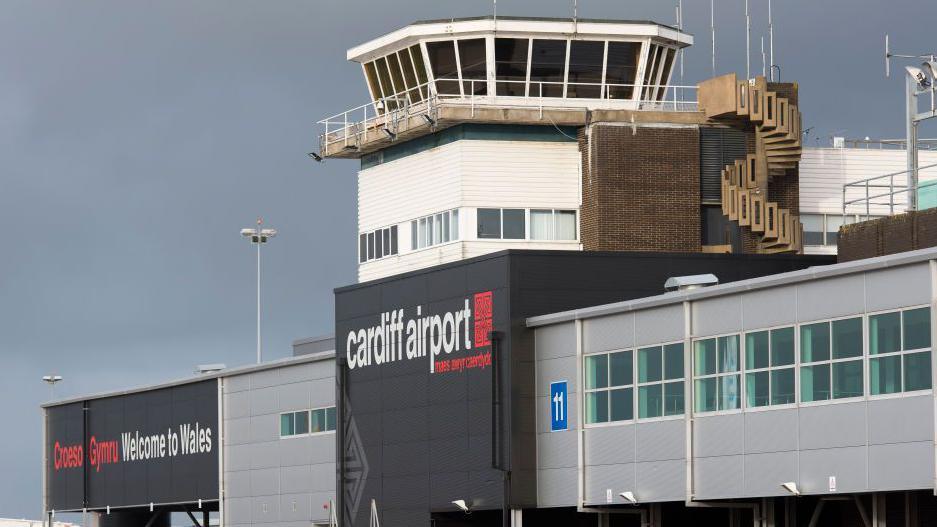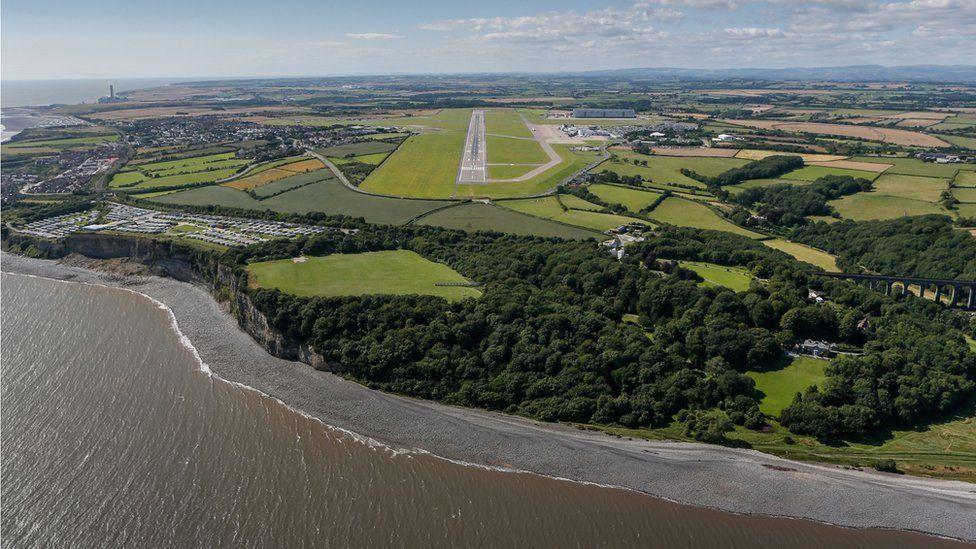Airport gets £206m to boost passenger numbers

Cardiff Airport marked its 70th birthday earlier this year
- Published
Cardiff Airport will receive more than £206 million to boost passenger numbers and improve facilities, the economy minister has announced.
Ken Skates said the airport would target two million passengers a year and develop its maintenance, cargo and sustainable aviation facilities as part of the ten-year funding deal.
The airport has been in public ownership since 2013 but Mr Skates said it would be for its management to spend the money “with commercial freedom”.
The Conservatives said Welsh people had been “well and truly fleeced” by the Labour government’s “vanity project”.
The government said its new investment in the airport would boost jobs and the wider economy, but its plan would need to be reviewed by the Competition and Markets Authority, external.
It would be “classed as a subsidy of particular interest under the UK subsidy regime", Mr Skates said.
Cardiff Airport has received tens of millions of pounds in loans and grants since being acquired by the Welsh government in 2013.
The existing spending totalled £179.6 million, which includes the original price paid for the airport, as well as other finance such as Covid loans and money for improvements and equipment.
It lost £4.5m in the year to March 2023 according to company accounts.
A new commitment to give £206 million over the next ten years comes after the government’s three-year Covid rescue package comes to an end.
Increased airport drop-off charges 'ridiculous'
- Published16 July 2024
Cardiff Airport not ready for new liquids limit
- Published5 April 2024
Cardiff Airport loses only direct Paris flight
- Published27 March 2024
In a written statement, Mr Skates said Cardiff Airport was “a vital element of Wales’ economic infrastructure” which contributed £200m to the economy every year.
“The airport, along with the neighbouring Bro Tathan business park, are at the nexus of the cluster of successful aviation and aerospace businesses in the region," he said.
“It provides a gateway into Wales for tourists, investors and the many thousands of visitors that come each year to enjoy the numerous sporting, cultural, business and trade events hosted in and around the capital."
The long-term strategy for the business will focus on attracting aviation businesses and growing passenger routes.
Mr Skates said targeting the new routes for airlines could see annual passenger numbers "increase to just over two million" within the next decade.
Developing new routes will prioritise European hub airports, North America and the Middle East and South Asia.
In 2023, around 840,000 passengers used Cardiff Airport, which is roughly half the number who travelled through it in 2019.
UK airports were all hit by travel restrictions during the pandemic, but Cardiff’s relatively small size has seen it take longer than others to begin recovering passenger numbers and routes.
Qatar Airways, which had operated a direct scheduled flight to Doha from Cardiff, has yet to resume the service.
But other carriers have increased their routes as confidence returned to the aviation industry.

Cardiff Airport passenger numbers are roughly half of those pre-Covid
Conservative Shadow Transport Minister Natasha Asghar said the Welsh government should sell the airport.
“The people of Wales have been well and truly fleeced with this vanity project, one of Labour’s most costly to date," she added.
“The Labour Welsh government have already shovelled nearly £200 million into the airport, with diminishing returns. More than doubling that investment is a colossal waste of money.
“Cardiff Airport should be sold to finally give Welsh taxpayers some respite.”
The government said it was “open-minded” about the airport's future ownership.
Cardiff Wales Airport Chief Executive Spencer Birns welcomed the move, adding: "This investment would enable us to continue providing economic benefits, creating more jobs across our country, being a gateway to the UK and Wales, and ensuring global connectivity.
“The airport currently facilitates more than 4,000 aviation-related jobs in the Vale of Glamorgan, by ensuring safe and secure airport operations at both Cardiff and St Athan, and typically drives over £200m of economic benefit to Wales annually."
He described the airport as "a national asset", saying 98% of airports around the world are owned by the communities they serve.